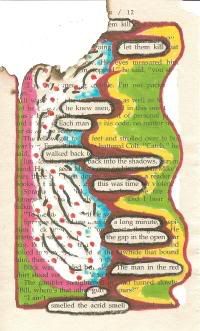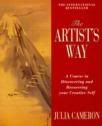I very much enjoyed
Lydia's post about how she got started as a writer and thought I'd respond. I did try to leave a comment over there, but it somehow disappeared into the ether. And anyway I'd rather like to run with the ball!
I can't remember a time when I didn't want to write. At school I had this great running rivalry with
my best friend Helen to see which of us could write the best composition for English classes. I ignored all other homework completely to put aside time to write because my poem or story had to be the best. We both wrote well above and beyond the call of duty, pages and pages where one or two would have sufficed. Helen always got a slightly higher grade though (and is now a published poet).
I still have my English exercise books (below) filled with my scribblings. My writing was frequently melodramatic and wonderfully florid! And always full of spelling errors. (Mild dyslexia?) It's pretty embarrassing to read them now.
I also started a diary in 1969 and kept it right up to the time I got married in 1990. (Too much honest writing left lying around probably wasn't a very good idea ... particularly as a diary is always a space for a good sound off! Keeping an online password protected journal was a substitute later on.)
But I digress.
I got my first poems published at 13 in the
Coventry Evening Telegraph and my first boyfriend, a gardener called Francis, was one of my fans ... although on the two occasions we actually met up for a date, I was so much taller than him that I walked in the gutter while he walked on the pavement!
Although I'd always told myself one day I'd love to write. I didn't start writing seriously until I was in my 40's. I guess that's a good point at which to evaluate your life since it hits you that the sand is slipping through the hour glass (speeding up, even) and if you don't do the things you want to do
now, you're probably never gonna.
But there was always the fear - would I measure up or end up disappointing myself in an area that meant so much to me? My favourite writers like Annie Proulx wagged their fingers at me saying "You'll never measure up." Spoilsports!
I also didn't know how to "get into" writing.
So when I saw an ad for a correspondence course with
The Open College for the Arts, I decided to give it a go. I found the materials they sent very useful, and the tutor I was assigned to gave me excellent feedback. But I didn't finish the course because:
First of all, I lost my nerve several units in when there was a big jump from simple exercises involving description to suddenly writing a complete short story. (How the hell do I think up a plot, I thought, in the days before I realised that plots can just happen onto paper if you let them.) Looking back, I think the course was aimed at more experienced writers.
Secondly, because this was in the days before the internet had really taken off (and OCA was a particularly slow adopter!), each assignment had to be mailed to the UK (with an international reply coupon inside it for the postage), and then there was a long wait for it to come back to me. My tutor felt so far away!
Thirdly, only my tutor saw my assignment and (afraid to show my efforts to those close to me)
I had no chance to see how other readers reacted to it. I felt so lonely!
Much more helpful to me was a book I found in a bookshop in London:
Writing for Self-Discovery: A Personal Guide to Creative Writing by Myra Schneider and John Killick which is a fantastic collection of exercises for exploring the material from your own life and experience. (The book appears to be currently out of print, but
you can buy it from Abebooks for as little as US$1.)
I went crazy, filling notebook after notebook with recollection and thoughts and fiction and dreams. I never knew I had so much inside that wanted to break free.
There were many other useful books, and I should say more about these, but this one was my catalyst, my turning point.
I signed up with
Writers Village which offers a whole range of short courses for one very reasonable joining fee and found friends and support. The course material is online, and the work posted to a bulletin board and feedback given by your coursemates rather than a tutor. The atmosphere was supportive and friendly, I made some writing buddies across the world (Most of the participants are from the US.) and the first two short stories I had published grew from assignments I posted there.
I also did a creative writing course organised by author Chuah Guat Eng at Silverfish. This was the first time I'd written with others and my - what a heady experience it turned out to be - with moments of real magic when we read back our pieces. Much much better than scribbling away lonely and alone!
But the teacher/trainer in me said ... hey ho, I want to encourage others to write and think I can do this better ... and that's why and how
my own course for beginners was born. (And it sounds as if Lydia is thinking along these lines too ... good for her!)
I've just finished one run of it at the British Council and hope that the next will be in November, when I finish the project I'm currently involved with and have had a chance to rediscover my
Mat Salleh roots in the UK for a few weeks.
There are lots of threads here I might pick up on another day.
But like Lydia I'd love to know, what got YOU writing?
 For those interested in the debate about whether creative writing can be taught or not, and the effectiveness of such courses, there is a fascinating (but very lengthy) overview of the impact of such courses on the American writing landscape at The New Yorker. Lois Menand, himself the product of a creative writing course (an experience he says he would not trade for anything) draws on Mark McGurl's The Program Era : Postwar Writing and the Rise of Creative Fiction . This book is also reviewed at Conversational Reading where Andrew Seal finds it :
For those interested in the debate about whether creative writing can be taught or not, and the effectiveness of such courses, there is a fascinating (but very lengthy) overview of the impact of such courses on the American writing landscape at The New Yorker. Lois Menand, himself the product of a creative writing course (an experience he says he would not trade for anything) draws on Mark McGurl's The Program Era : Postwar Writing and the Rise of Creative Fiction . This book is also reviewed at Conversational Reading where Andrew Seal finds it :








